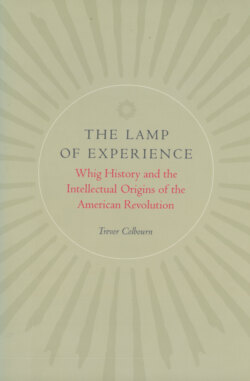Читать книгу The Lamp of Experience - Trevor Colbourn - Страница 8
На сайте Литреса книга снята с продажи.
ОглавлениеPreface to the 1965 Edition
The American Revolution has never wanted for attention, but important chapters of the intellectual history of the Revolution have yet to be written. The political philosophy of the Revolutionaries is familiar; their historical justification for independence is not. The eighteenth-century American colonist was born into an environment formed by history as well as philosophy, and for many, history afforded an argument more persuasive, more tangible.
Persuasion was important. Americans were not eager to separate from their mother country. “No man was ever more warmly attached to the Hanover family,” confessed George Mason of Virginia, adding that “few men had stronger prejudices in favor of that form of government … or a greater aversion to changing it.” And John Adams agreed that “revolutions are no trifles. They ought never to be undertaken rashly.” Independence was for most a last resort, the final move in defense of traditional English rights now put in jeopardy by a sovereignty-mad British administration.
This study seeks to explore some colonial concepts of the rights of Englishmen to which they laid claim; it explores the sources of such concepts and the historical perspective such sources afforded. The reading habits of the Revolutionaries disclose a remarkable devotion to the study of English history. Books—library books—are in themselves an important species of source material, frequently as revealing as personal correspondence and potentially more honest than a diary aimed deliberately at posterity. Obviously a library catalogue, taken alone, can be a deceptive document: few people have read all the books on their shelves, and ownership of an unread book means little. But in association with other evidence, such as notes, marginalia, citations, recommendations, repeated purchases, books can be evaluated; and then, by reading them, one can re-create the perspective of an earlier age.
The history books read by the Revolutionary leaders did not supply their motivation for political action. The dangers of implying such causation are painfully obvious. The most that can be claimed is that the character of their reading, their particular preferences and comments on them, do inform powerfully on their political thought and final action. Carl Becker once observed that “generally speaking, men are influenced by books which clarify their own thought, which express their own motives well, or which suggest to them ideas which their minds are already predisposed to accept.” Even within these limits, the historical reading of eighteenth-century American colonists illuminates much of their political conduct toward the mother country they studied so assiduously.
Americans shared with certain English contemporaries common attitudes toward history and its relevance to England’s political, moral, and constitutional condition. Both the colonists’ ideas of the past and their employment of those ideas contribute substantially to our understanding of the Revolutionary generation.
The obligations incurred in preparing this study are too numerous to list in detail. But I am particularly indebted to my patient wife, Beryl, John H. Powell, Douglass Adair, James Morton Smith, Russel Nye, Robert H. Ferrell, and Alexander R. Butler for editorial and organizational suggestions. In addition Caroline Robbins and E. Millicent Sowerby have been extraordinarily generous with their time, counsel, and friendship. The assistance furnished by Julian P. Boyd, Lyman H. Butterfield, and Edwin Wolf 2nd has been invaluable. Research has been assisted by generous grants from the Institute of Early American History and Culture, the Library Company of Philadelphia, and the Pennsylvania State and Indiana Universities.
Portions of chapter 8 appeared in the William and Mary Quarterly, 3d ser., 15 (1958); portions of chapter 6 derive from the Boyd Lee Spahr Lecture at Dickinson College, November 1958 (published in Early Dickinsoniana, Carlisle, Pa., 1961), and the Pennsylvania Magazine of History and Biography, 83 (1959). I am grateful to the Adams Manuscript Trust for permission to print the history listings in John Adams’s 1790 catalogue.
Bernard Bailyn’s first volume of Pamphlets of the American Revolution, 1750–1776 (Cambridge, Mass., 1965) came to hand as this study went to press; the relevance of his brilliant introductory essay and his superbly presented pamphlets will be widely appreciated.
H. T. C.
